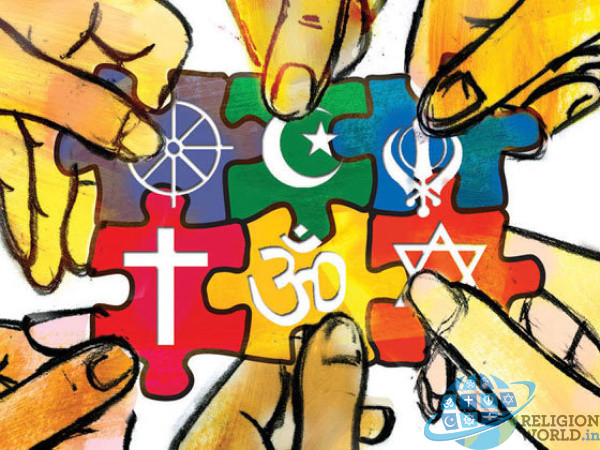Religion in the World
 A new survey by WIN/Gallup International explores religious beliefs of over 66.000 people in 68 countries across the world. The results show that 6 out of 10 people in the world (62%) consider themselves to be religious, while less than a quarter (25%) think of themselves as non-religious and 9% consider themselves atheists.
A new survey by WIN/Gallup International explores religious beliefs of over 66.000 people in 68 countries across the world. The results show that 6 out of 10 people in the world (62%) consider themselves to be religious, while less than a quarter (25%) think of themselves as non-religious and 9% consider themselves atheists.
It has been found that levels of religiosity diminish as income and education levels of the interviewees increase. While 66% of people with low income affirm to be religious, this percentage drops to 50% among people with high income. The same trend is verified in relation to education levels: 83% of people with lower education level are religious against 49% of higher level.
• 62% of people in the world define themselves as religious.
• 74% of people globally believe we have a soul and 71% believe in God; while 56% believe in heaven, 54% in life after death and 49% in hell.
• There is a connection between religiosity, beliefs and socio-demographic characteristics – such as age, income and education level. In general, as education and income levels grow higher, religiosity levels tend to diminish. On the other hand, the expression of different beliefs is higher among young people.
• The most religious countries are Thailand (98%) and Nigeria (97%), followed by Kosovo, India, Ghana, Papua New Guinea and Ivory Coast (all of them with 94%). China is the least religious country, where almost 7 out of 10 people are atheists, more than double than any other country, and 23% consider themselves non-religious people.
• As for the different beliefs that were analyzed: God, soul, life after death, hell and heaven; the most believing countries are Bangladesh, Indonesia, Ghana, Pakistan and Papua New Guinea.
Most religious and least religious countries
Thailand is the most religious country, with almost its entire population (98%) declaring to be religious. Next to Thailand, the countries that stand out as most religious are Nigeria (97%), Kosovo, India, Ghana, Ivory Coast, Papua New Guinea (all of them with 94%), Fiji (92%), Armenia (92%) and Philippines (90%).
On the opposite end, China is the least religious country, with 7 out of 10 people claiming to be atheists (67%) -over twice the percentage found in any other country- and a further of 23% of Chinese defining themselves as non-religious. Only 9% are religious.
Following China among the least religious countries we find Sweden, Czech Republic and United Kingdom with 7 out of 10 people who said to be atheist or non-religious (18% and 55% in Sweden, 25% and 47% in Czech Republic, 11% and 58% in the United Kingdom).
Religious beliefs: God, Soul, heaven, hell and life after death
The majority of people worldwide believe in the soul (74%) and in God (71%), while nearly half of them believe in heaven (56%), life after death (54%) and hell (49%).
The analysis of religious beliefs by different socio-demographic strata shows interesting results. It reveals that all beliefs diminish as the interviewee’s age rises: 74% of young people between 18 and 24 years old believe in God, while this percentage drops to 67% in those aged 65 and older. Believing in life after death goes from 60% in the youngest strata to 45% in the oldest; the belief in soul goes from 78% to 68%; the belief in hell goes from 57% to 35%; while the belief in heaven drops from 64% in the youngest and 46% in the oldest.
Those without education express more beliefs than those who reached higher levels of education and those who have less available income express more beliefs than those with higher income.
Beliefs by country
Bangladesh and Indonesia are the most believing countries, where almost their entire populations claim to believe in God, in life after death, in the soul, in heaven and in hell. These countries are followed by Ghana and Pakistan, where each of the religious beliefs surpass 95%.
On the other hand, China is the least believing country, where religious beliefs reach values inferior to 20%. China is followed by Czech Republic, Japan, Belgium, Sweden and Denmark as countries with lower belief levels.
Finally, it is important to highlight that the belief in God obtains 100% mentions in: Indonesia, Ghana, Nigeria, Kosovo and Azerbaijan.
Vilma Scarpino, interim President of WIN/Gallup International Association, said: “The survey confirmed that religion is a relevant aspect in the lives of individuals at a worldwide level, even though the history of each country and the levels of education have a considerable influence on the perception of these values. The figures related to spiritual beliefs – around three quarters of the world population interviewed believe in the soul and in God – show us how important it is for the majority of world population to have a faith and to rely on it. Women and young people show higher percentages for the spiritual aspects – God, life after death, soul, hell and heaven”.










